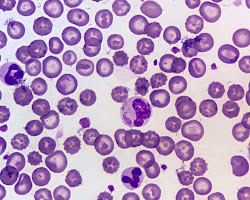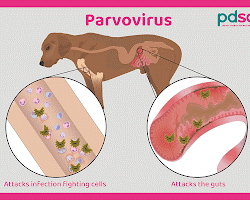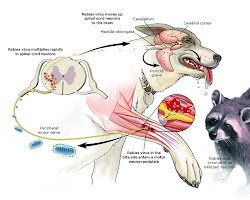Vaccines for Pets
Vaccines are a crucial part of preventive healthcare for pets. They work by stimulating the immune system to produce a protective response to specific disease-causing agents. This can help prevent your pet from getting sick or, if they do get sick, it can help them fight off the infection more easily.
There are two types of vaccines for pets: core vaccines and non-core vaccines. Core vaccines are recommended for all pets, regardless of lifestyle or location. Non-core vaccines may be recommended based on a pet’s lifestyle, age, and risk factors.
Pets can get side effects from vaccines, but these are usually mild and go away on their own. Some common side effects include soreness at the injection site, lethargy, and loss of appetite.
| Vaccines | Detail | |
|---|---|---|
| Core Vaccines Dog | Distemper: This is a highly contagious virus that can cause a variety of serious health problems, including neurological damage, seizures, and death. |  |
| Parvovirus | This is a highly contagious virus that can cause vomiting, diarrhea, and dehydration. In severe cases, it can be fatal. |  |
| Adenovirus | This virus can cause respiratory infections, eye infections, and kennel cough. | |
| Rabies | This is a fatal virus that is transmitted through the bite of an infected animal. |  |
| Non-Core Vaccines | ||
|---|---|---|
| Bordetella | This vaccine can help prevent kennel cough, a respiratory infection that is common in dogs. It is administered by vets as a squirt in the nose. Not all dogs need this vaccine, but we recommend it for social dogs and any dogs who will be boarded (most boarding facilities require proof of a recent Bordetella vaccine). Additionally, dogs with weaker immune systems (including senior dogs and young puppies) should get the vaccine. | |
| Lyme disease | This is a bacterial infection that is transmitted through the bite of an infected tick. | |
| Leptospirosis | This is a bacterial infection that can cause a variety of health problems, including kidney failure, liver failure, and respiratory problems. | |
Core Vaccines Cats
Core vaccines are essential for protecting your cat from serious diseases. They are typically given to kittens starting at 6 weeks of age, and then again every 3-4 weeks until they are 16 weeks old. After that, most cats need a booster vaccine every 1-3 years.
Feline panleukopenia virus (FPV): This is also known as feline distemper. It is a highly contagious disease that can cause severe illness, including vomiting, diarrhea, weight loss, and even death.
Feline herpesvirus 1 (FHV-1): This virus is the cause of upper respiratory infections in cats. Symptoms can include sneezing, coughing, runny eyes, and fever.
Feline calicivirus (FCV): This virus is also a common cause of upper respiratory infections in cats. Symptoms can be similar to those caused by FHV-1, but FCV can also cause ulcers in the mouth and on the tongue.
Rabies virus: Rabies is a deadly virus that can be transmitted through the bite of an infected animal. It is important to vaccinate your cat against rabies, even if they are an indoor cat.
Other vaccine
Feline leukemia virus (FeLV): This virus can cause a variety of health problems in cats, including anemia, bone marrow failure, and cancer.
Feline immunodeficiency virus (FIV): This virus can cause a weakened immune system in cats, making them more susceptible to other infections.
Why Booster Shots Are Important
Booster shots are important to ensure that your pet’s immunity to disease remains strong. The interval between boosters is carefully chosen to give the immune system enough time to produce a strong response to the vaccine.
| DOG | ||
|---|---|---|
| Puppies | Puppies should receive their first set of vaccines between 6-8 weeks of age. They will need two sets of boosters, one 3-4 weeks after the first vaccine and the second 12-14 weeks after the first vaccine. |
|
| Adults | Adult dogs should receive a booster one year after their last booster vaccine. They will then need boosters every 3 years. |
|
| Seniors | Senior pets may have a weaker immune system and be more vulnerable to disease. They may need more frequent boosters to maintain their immunity. |
|
| CATS | ||
|---|---|---|
| Kittens | At 6-8 weeks of age: Kittens should receive their first set of vaccines, which protect against feline viral rhinotracheitis, calicivirus, panleukopenia, and rabies. At 10-12 weeks of age: Kittens should receive their second set of vaccines, which protect against the same diseases as the first set. |
|
| Adults | One year after the initial series: Adults should receive a booster vaccine to protect against feline viral rhinotracheitis, calicivirus, and panleukopenia. |
|
| Seniors | Senior cats may need more frequent boosters: As cats age, their immune systems may weaken, so they may need more frequent boosters to maintain their immunity against these diseases. |
|
- Talk to your veterinarian about what vaccines are appropriate for your pet.
- They can help you create a vaccination schedule that is right for your pet’s individual needs. Protecting your pet and the community
- As a pet owner, you play a vital role in keeping your pet healthy.
- In addition to providing a nutritious diet and regular exercise, you should also keep up-to-date on your pet’s vaccines.
- By doing so, you’re not only protecting your own pet, but you’re also helping to prevent the spread of disease to other pets in the community.
- Reduced risk of illness: Vaccines help to protect your pet from serious and potentially life-threatening diseases.
- Reduced risk of hospitalization: If your pet does get sick, vaccines can help to reduce the severity of the illness and the need for hospitalization.
- Reduced cost of care: Vaccines can help to save you money on veterinary care by preventing expensive illnesses.
- Peace of mind: Knowing that your pet is protected from disease can give you peace of mind.
The most common vaccine for pets is the rabies vaccine. Rabies is a fatal virus that is transmitted through the bite of an infected animal.
